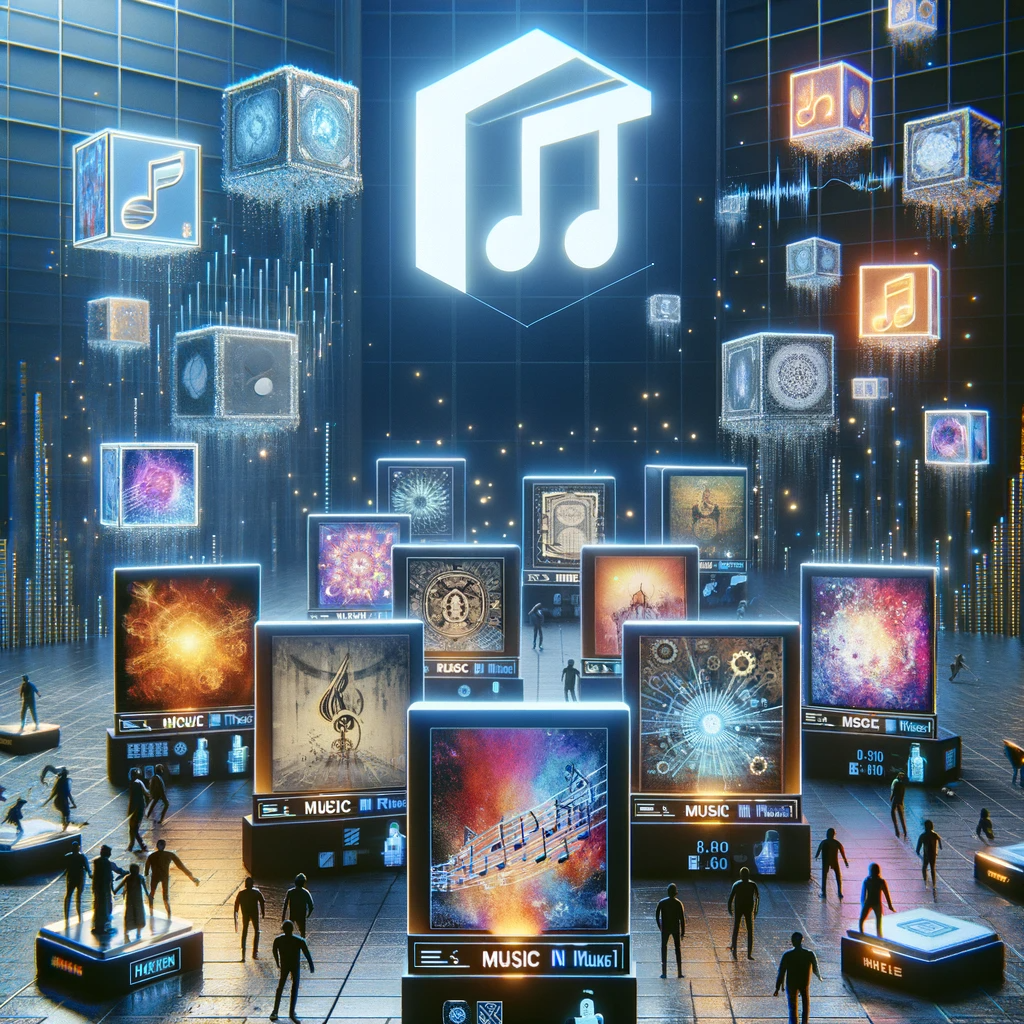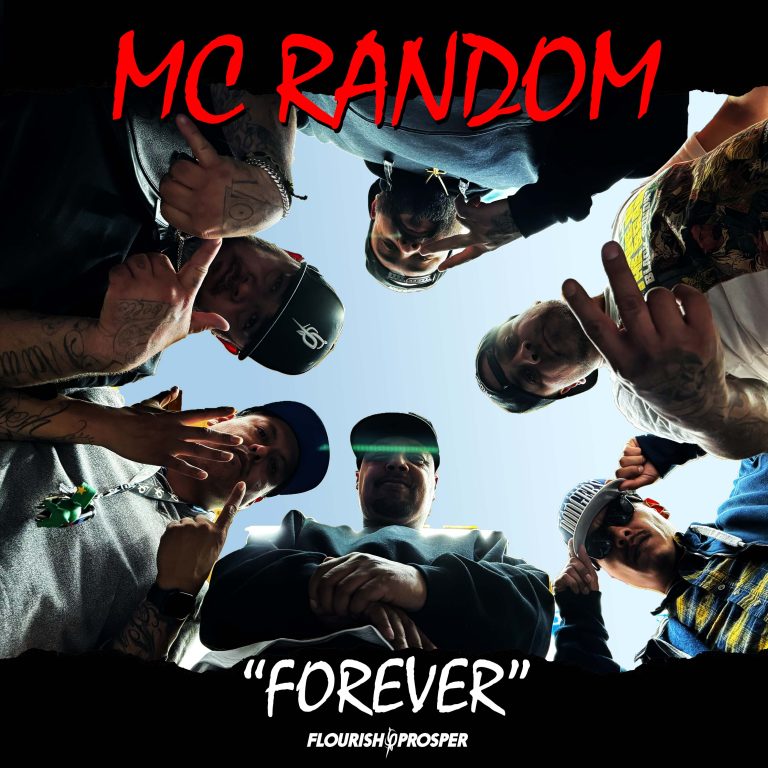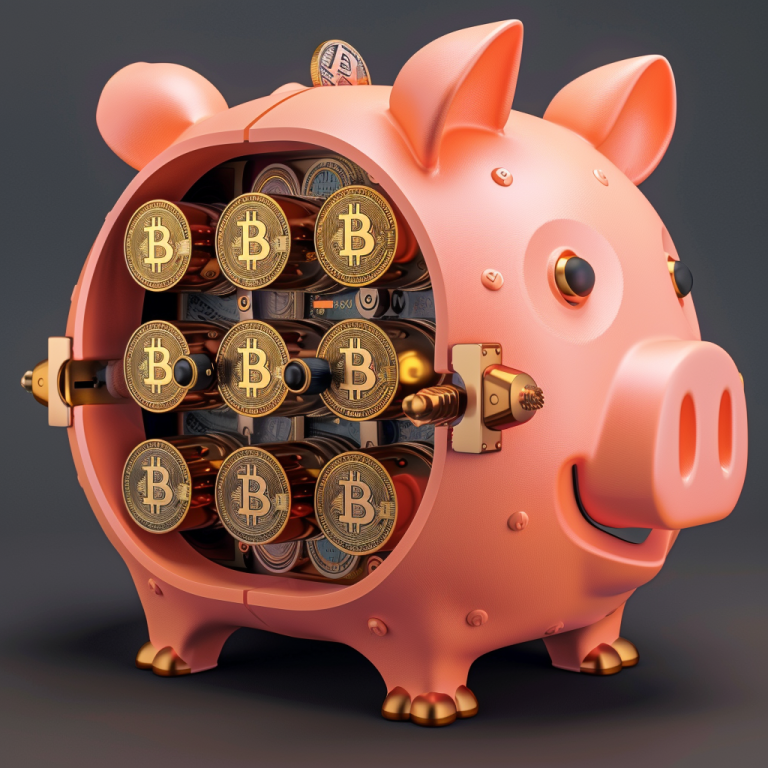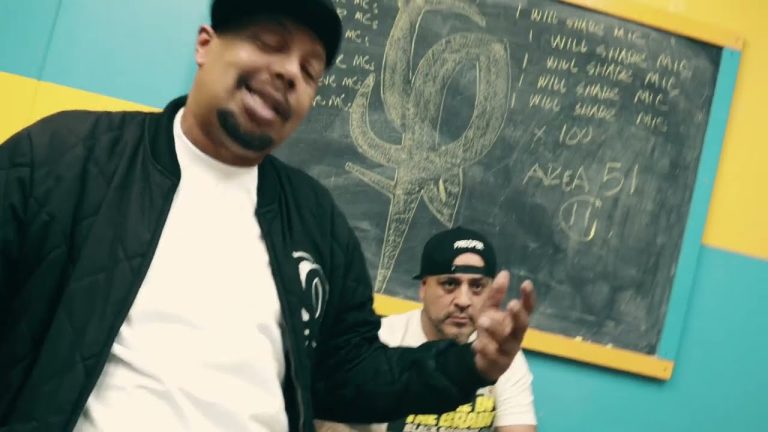Introduction to the World of Music NFTs
The digital revolution is highly transformative, and music, as an integral part of our culture, is not left out of this evolution. One significant development that has gained the spotlight recently is the marriage of blockchain technology with the music industry in the form of Non-Fungible Tokens (NFTs). This introduction aims to provide readers with a comprehensive understanding of the world of Music NFTs – a revolutionary manifestation of music ownership.
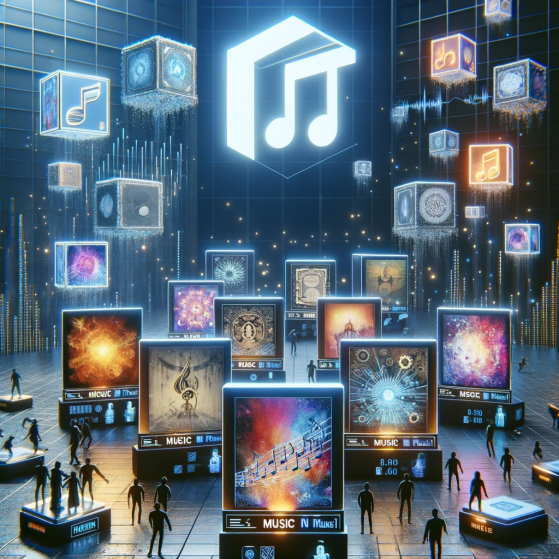
Understanding the Basics: What are Music NFTs?
At their core, Music NFTs are digital assets representing ownership or proof of rights to a piece of music or related products, stored securely on a blockchain network. Unlike cryptocurrencies like Bitcoin or Ethereum, which are fungible and can be interchanged, NFTs are unique and can’t be replaced with something else. A Music NFT could represent anything from a music track, album art, concert tickets, or even a musician’s merchandise. Essentially, it can encapsulate any form of creative output in the music landscape that can be digitized.
NFTs and the Blockchain Ecosystem
Music NFTs operate within the broader blockchain ecosystem. It’s a decentralized technology that records transactions across many computers so that the record can’t be altered retroactively. The application of this technology to the music industry ensures the immutable proof of ownership and authenticity for Music NFTs. Blockchain also opens the door to smart contracts, allowing automatic royalty payments and offering unparalleled transparency in dealings.
The Impact of Music NFTs on Music Ownership
Traditional music ownership has often been clouded by opaque royalty systems and contentious rights management. However, the advent of Music NFTs promises to revolutionize this by providing a transparent, verifiable form of music ownership. With NFTs, artists can sell their work directly to fans, bypassing the need for intermediaries. Fans, on the other hand, can gain exclusive ownership over unique music content, influencing a deeper connection between artists and their audiences.
Demystifying the Concept of Blockchain in the Music Industry
Understanding Blockchain’s Role in Music
Blockchain is often reduced to its role in cryptocurrencies, but its potential extends much further. In the context of the music industry, blockchain technology can create a transparent and efficient system for managing musical assets. It serves as a decentralized and immutable ledger where every transaction related to a musical piece, from creation to sale, can be recorded. This allows for unparalleled traceability and security, mitigating issues such as double spending and unauthorized copying.
On the blockchain, each musical work can have a unique identity and associated metadata such as the artist’s name, composition details, right holders, and the history of ownership. Changes can only be made by authenticated users, preventing unauthorized alterations.
The Intersection of NFTs, Blockchain, and Music
This is where the concept of Non-Fungible Tokens (NFTs) comes into play. NFTs are essentially blockchain-based certificates of ownership for digital or physical assets. In the music industry, these could include songs, albums, merchandise, concert tickets, or even a piece of an artist’s royalties.
Each music NFT is unique and can’t be replaced with something else, making it a perfect tool to demonstrate exclusive ownership. When an artist mints a song as an NFT, they essentially transform their creation into a tangible asset that can be bought, sold, or held just like physical goods.
Benefits to Artists and Fans
One of the groundbreaking capabilities of introducing blockchain to the music industry is how it alters the traditional intermediary-heavy distribution model. With blockchain, artists can sell their works directly to fans as NFTs, retaining more profits and control over their intellectual property. This new way of direct interaction also fosters stronger connections between artists and fans.
Moreover, artists can code royalties into their NFTs, whereby they receive a percentage of any future resales, ensuring that they continue to benefit financially from their work’s success. Meanwhile, fans gain from owning a unique piece of work directly from their favorite artists, potentially appreciating in value over time.
Blockchain and NFTs are reshaping the face of the music industry, offering a level of transparency, security, and control previously unseen. While the technology is still in its infancy stages within this industry, it holds the potential to revolutionize how we perceive music ownership and distribution.
Significance of Music NFTs in Music Ownership
Democratizing Music Ownership via Music NFTs
In the traditional music industry, artists have often been tied to major labels for distribution and promotion of their work. These arrangements usually come at the expense of the artist’s full ownership rights to the released music. The advent of Music NFTs (Non-Fungible Tokens), however, is revolutionizing this dynamic. By offering a blockchain-based platform for the creation and sale of digital assets, musicians are now able to tokenize their music and retain full ownership. This form of democratization is shifting power dynamics within the industry, empowering independent artists and fostering an ecosystem of direct artist-to-listener interactions.
NFTs: An Asset Class Redefining Value in Music
Traditionally, the value of music was determined by physical or digital sales, airplay, and streaming statistics. However, with Music NFTs, the relationship between artists and fans evolves into the realm of investment. Fans can acquire a piece of music as an NFT, effectively becoming stakeholders. This new asset class provides potential financial benefits for both parties.
For artists, it offers a new revenue stream and the potential for appreciation in value over time. As for fans, owning music NFTs could provide not only sentimental value but also monetary returns if the NFT appreciates in value due to increased demand or limited supply.
Music NFTs: Bringing Authenticity and Scarcity to the Digital Realm
In the era of unlimited digital replication, music piracy has often led to artists losing control and benefits from their work. Music NFTs bring a solution to this problem through the unique characteristics of blockchain technology – authenticity and scarcity. When a piece of music is tokenized as an NFT, it gets linked to unique information on the blockchain, verifying its authenticity and tying it to its rightful owner.
Furthermore, with blockchain’s capabilities, artists can control and dictate the rarity of these music NFTs by limiting its copies available for purchase. This not only brings the concept of scarcity into the digital realm of music but also allows artists to further capitalize on their creations.
Real-World Applications and Cases of Music NFTs
A New Avenue for Artists: High-Profile Cases
One of the most prominent cases of Music NFTs in application was when the musician Grimes sold around $6 million worth of digital artworks as NFTs, some of which included exclusive music. Similarly, Kings of Leon became the first band ever to release an album as an NFT. Their release includes a package containing unique cover art, digital download, and interactive experiences.
Spottie Wifi, described as the first “cryptopunk” rapper, represents a unique fusion of digital art and music within the cryptocurrency and blockchain sphere. Cryptopunks are a well-known series of digital art pieces, which have gained significant popularity and value as non-fungible tokens (NFTs). The character of Spottie Wifi, being a cryptopunk rapper, suggests an integration of this digital art aesthetic with the music world, particularly in the rap genre.
This concept embodies the growing trend of blending art, technology, and music, where the identity and persona of the artist are as much a part of the digital and blockchain world as their music. Spottie Wifi, in this context, is not just a musician but also a digital asset and a representation of the intersection between modern digital culture and traditional artistic expression.
These cases signify a shift in how music and the related art can be owned. NFTs have introduced a new scheme where fans can own exclusive artist content, creating a deeper connection between the artist and the fan.
Reinventing Concert Experiences
Music NFTs have also found their use in providing unique concert experiences. The Weeknd, in partnership with Nifty Gateway, sold an unreleased song along with limited edition artwork as an NFT. The highest bidder won the chance to experience a live performance of the song.
The blockchain company YellowHeart is looking to use NFTs to allow artists to sell tickets for concerts and events. This would not only eliminate the issue of ticket scalping but also ensure the authenticity of the ticket, thereby enhancing user experience.
NFTs Driving Music Innovation
NFTs are also driving innovation in the music industry. The EDM artist 3LAU made headlines when he sold the world’s first mainstream tokenized album for a total of $11.6 million. The buyers were granted the opportunity to collaborate with the artist on a new track, depicting a novel way of fan engagement.
Moreover, startups like Catalog are leveraging NFTs to create fractional ownership of songs. This means that rather than one entity owning the rights to a song, multiple individuals can own a piece of the song.
These examples underline that Music NFTs are not just a passing trend but a shift in the music industry infrastructure that is fundamentally altering the dynamics of music ownership, consumption, and experiences.
Breaking Down the Process of Creating Music NFTs
Understanding Music NFTs
It’s important to first grasp what Music NFTs are before diving into the creation process. Non-Fungible Tokens (NFTs) represent unique digital assets on the blockchain, and when applied to music, these tokens provide proof of ownership over a specific piece of content. This could be a song, album, or even a limited-edition merchandise. Unlike traditional music distribution methods, the ownership rights are directly transferred to the buyer, allowing artists to retain more control and potentially profit.
Creating Your Unique Music Token
The first step in creating a Music NFT is deciding what it will represent – whether one song, an album, or a unique fan experience. Once that’s decided, the artist or their team can mint this NFT on various platforms such as OpenSea or Rarible. Minting involves uploading your digital content and creating a unique identification for it on the blockchain. It’s also where you set the price for your NFT. It’s recommended artists set a fair price that reflects the value they offer but doesn’t deter potential buyers with high costs.
Marketing and Selling Your Music NFT
After successfully minting the token, the next step is marketing. Good marketing can greatly increase the visibility and desirability of your NFT. You can use your social media channels, email newsletters, and other promotional means to inform your audience about your NFT. Include details like its uniqueness, what the owner will get, the price, and where they can buy it.
Once the marketing phase is done, you’re ready to list your NFT for sale on the marketplace where you minted it. Interested buyers can then purchase it using cryptocurrency. After a successful sale, the buyer receives the NFT, thereby gaining ownership rights to the music or experience that the NFT represents, while the artist receives the proceeds from the sale.
Creating Music NFTs can seem complex, but breaking it down into these steps and understanding the process can make it manageable and even exciting for artists looking to capitalize on this new technology.
Challenges and Concerns Regarding Music NFTs
Issues of Ownership and Copyright
In the realm of music NFTs, issues of ownership and copyright pose significant challenges. While NFTs can offer a new layer of control for artists over their work, they also introduce complex legal issues. Buyers of a music NFT do not necessarily acquire the intellectual property rights of the music piece. They only own the token tied to the work. This disconnect between owning an NFT and owning the copyright of the embedded music creates confusion and potential legal disputes, especially when the buyer decides to utilize the music commercially.
Environmental Concerns
Another concern centers around the environmental impact of NFTs. All blockchain transactions, including NFTs, are energy-intensive and contribute to carbon emissions. For example, Ethereum—the platform where many NFTs are bought and sold—uses a proof-of-work system, which is notorious for its high energy usage. As a result, the environmental footprint of music NFTs worries both creators and consumers who are concerned about climate change.
Market Volatility and Fair Compensation
The inherent volatility of cryptocurrencies, which underlie NFTs, poses another challenge. The value of an NFT can fluctuate wildly with the market dynamics of cryptocurrencies. This volatility can create financial instability for artists and buyers alike.
Furthermore, there’s the issue of fair compensation. Though NFTs have the potential to ensure better pay for artists, this is not always the case. An artist might make an upfront profit from the initial sale, but miss out on future profits if the token increases in value. Contrastingly, some platforms offer royalty features enabling artists to receive a percentage of future sales. However, these models vary widely and can be subject to abuse, leaving artists vulnerable.
The Future Landscape of Music Ownership with NFTs
The Transformative Influence of NFTs on Music Ownership
The advent and application of blockchain technology to the realm of music is redefining the context of ownership. Non-Fungible Tokens (NFTs) in the music industry enable artists to tokenize their music and sell pieces directly to fans, effectively bypassing traditional intermediaries. This wave of decentralization ensures greater control for creators over their work. Artists can now monetize their catalogue more effectively with the use of NFTs, as they offer unique digital signatures ensuring authenticity and ownership.
A future landscape where NFTs are fully integrated into the music industry implies that listeners no longer just own a copy of an artist’s work, but a portion of the work itself. A revolution is upon us where fans could be rewarded with royalties each time a song they own an NFT of is played.
NFTs: Reinventing The Music Marketplace
NFTs are set to overhaul the dynamics of the music marketplace. This shift towards digital collectibles could potentially establish a new line of revenue for artists, both budding and established, through the sale of digitized albums, video clips or exceptionally, exclusive performances.
The direct-to-consumer model fostered by NFTs enables the creation of a more intimate relationship between artists and their audience. It could even pave the way for the democratization of the music industry, allowing independent artists to compete in the same sphere as major record labels.
Addressing Concerns and Potential Challenges
Despite the enormous potential, there are valid concerns and challenges confronting this evolving landscape. Intellectual property rights, piracy, and the environmental impact of blockchain technology are all areas that will need to be addressed.
In terms of intellectual property, it’s essential to clarify what owning an NFT actually means. Does it grant the holder the right to use the song in any way they see fit, or is it simply possession of a digital collectible?
On the environmental front, as more artists adopt NFTs, the ecological footprint of minting tokens on the blockchain will need to be mitigated. Some solutions suggest a switch to more energy-efficient consensus mechanisms or creating carbon offsets.
In conclusion, while the future landscape presents challenges, the integration of NFTs in the music industry could offer a revitalized model for music ownership, giving artists more control and fans a closer connection to the music they love.

